As you may already know, Windows shares your computer's CPU resources between running apps. How many resources will be given to a process is determined by its priority. The higher the priority level, the more resources will be allocated to the process. In this article, we will see how to add the 'Run With Priority' context menu to start an app with the desired priority level in Windows 10.
Advertisеment
There are 6 priority levels available to processes in Windows, as follows:
- Low
- Below normal
- Normal
- Above normal
- High
- Realtime
Normal is the default level. Most apps start with this priority level and run without issues. The user can temporarily change process priority to speed up the app or slow it down and make it consume less resources. A new priority level applied to the app will take effect till the app's process terminates. Once you exit it, the next time it will open with the default priority level (Normal) unless the app itself has a setting to change its priority automatically.
Some apps can adjust their priority automatically. The popular WinRAR and 7-Zip archivers are able to raise its priority to "Above normal" to speed up the archiving process. Or media players like Winamp can raise their process priority during playback.
Before you proceed, you need to know the following. The Realtime priority level is not meant to be set by the user. It can cause system instability. An application running at this priority can consume 100% of CPU and intercept keyboard and mouse input, making the PC unusable.
The Run With Priority context menu will contain the following subcommands:
- Low
- Below normal
- Normal
- Above normal
- High
- Realtime
See the following screenshot:
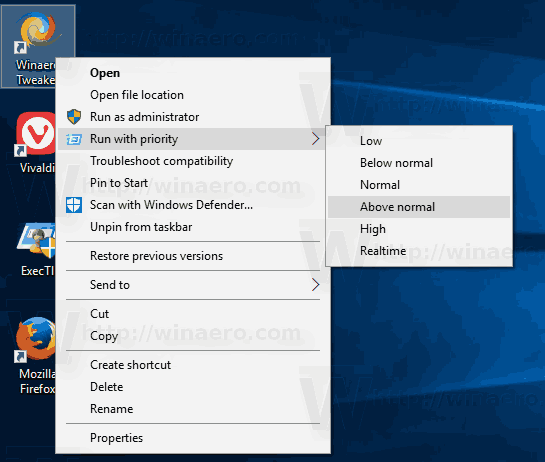
These commands are options are priority levels available in Windows 10, each of them will set the appropriate priority level of the selected app.
To add the Run With Priority context menu in Windows 10, do the following.
- Run Notepad. Copy and paste the Registry tweak's contents below into a new text file.
Windows Registry Editor Version 5.00 [HKEY_CLASSES_ROOT\exefile\Shell\RunWithPriority] "MUIVerb"="Run with priority" "SubCommands"="" "Icon"="shell32.dll,-25" ; Low [HKEY_CLASSES_ROOT\exefile\Shell\RunWithPriority\Shell\01Low] @="Low" [HKEY_CLASSES_ROOT\exefile\Shell\RunWithPriority\Shell\01Low\command] @="cmd.exe /c start \"\" /Low \"%1\"" ; Below normal [HKEY_CLASSES_ROOT\exefile\Shell\RunWithPriority\Shell\03BelowNormal] @="Below normal" [HKEY_CLASSES_ROOT\exefile\Shell\RunWithPriority\Shell\03BelowNormal\command] @="cmd.exe /c start \"\" /BelowNormal \"%1\"" ; Normal [HKEY_CLASSES_ROOT\exefile\Shell\RunWithPriority\Shell\04Normal] @="Normal" [HKEY_CLASSES_ROOT\exefile\Shell\RunWithPriority\Shell\04Normal\command] @="cmd.exe /c start \"\" /Normal \"%1\"" ; Above Normal [HKEY_CLASSES_ROOT\exefile\Shell\RunWithPriority\Shell\05AboveNormal] @="Above normal" [HKEY_CLASSES_ROOT\exefile\Shell\RunWithPriority\Shell\05AboveNormal\command] @="cmd.exe /c start \"\" /AboveNormal \"%1\"" ; High [HKEY_CLASSES_ROOT\exefile\Shell\RunWithPriority\Shell\06High] @="High" [HKEY_CLASSES_ROOT\exefile\Shell\RunWithPriority\Shell\06High\command] @="cmd.exe /c start \"\" /High \"%1\"" ; Realtime [HKEY_CLASSES_ROOT\exefile\Shell\RunWithPriority\Shell\07Realtime] @="Realtime" [HKEY_CLASSES_ROOT\exefile\Shell\RunWithPriority\Shell\07Realtime\command] @="cmd.exe /c start \"\" /Realtime \"%1\""
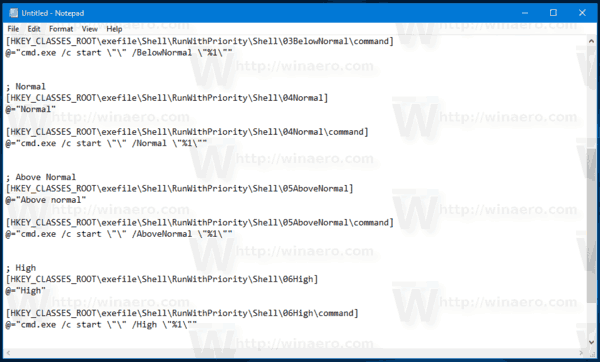
- In Notepad, press Ctrl + S or execute the File - Save item in the menu. This will open the Save dialog. There, type or copy-paste the following name "menu.reg" including quotes. Double quotes are important to ensure that the file will get the "*.reg" extension and not *.reg.txt. You can save the file to any desired location, for example, you can put it in your Desktop folder.
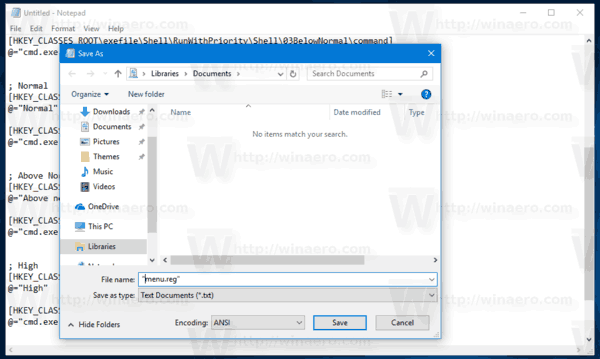
- Now, double-click the file menu.reg that you created. Confirm the UAC prompt and click Yes to merge it into the Registry.
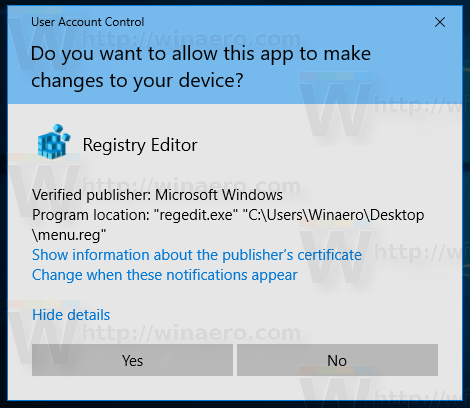
The context menu command will get added to your context menu instantly.
You can use Winaero Tweaker to add the context menu quickly. Enable the option under Context Menu\Run with priority.
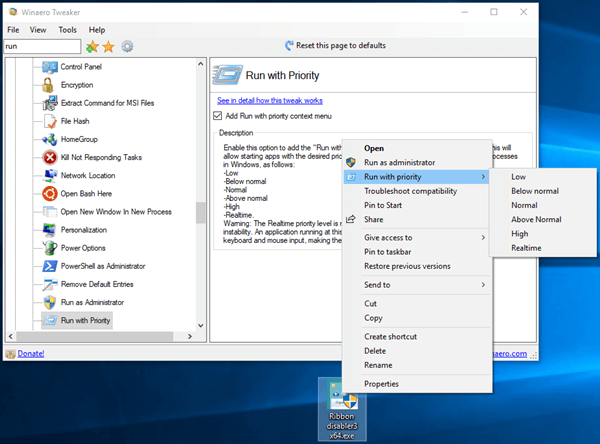
You can get the app here:
To save your time, I made ready-to-use Registry files. You can download them here:
The undo file is included, so you can avoid manual Registry editing completely.
Now read: How to Change Process Priority in Windows 10.
That's it.
Support us
Winaero greatly relies on your support. You can help the site keep bringing you interesting and useful content and software by using these options:
